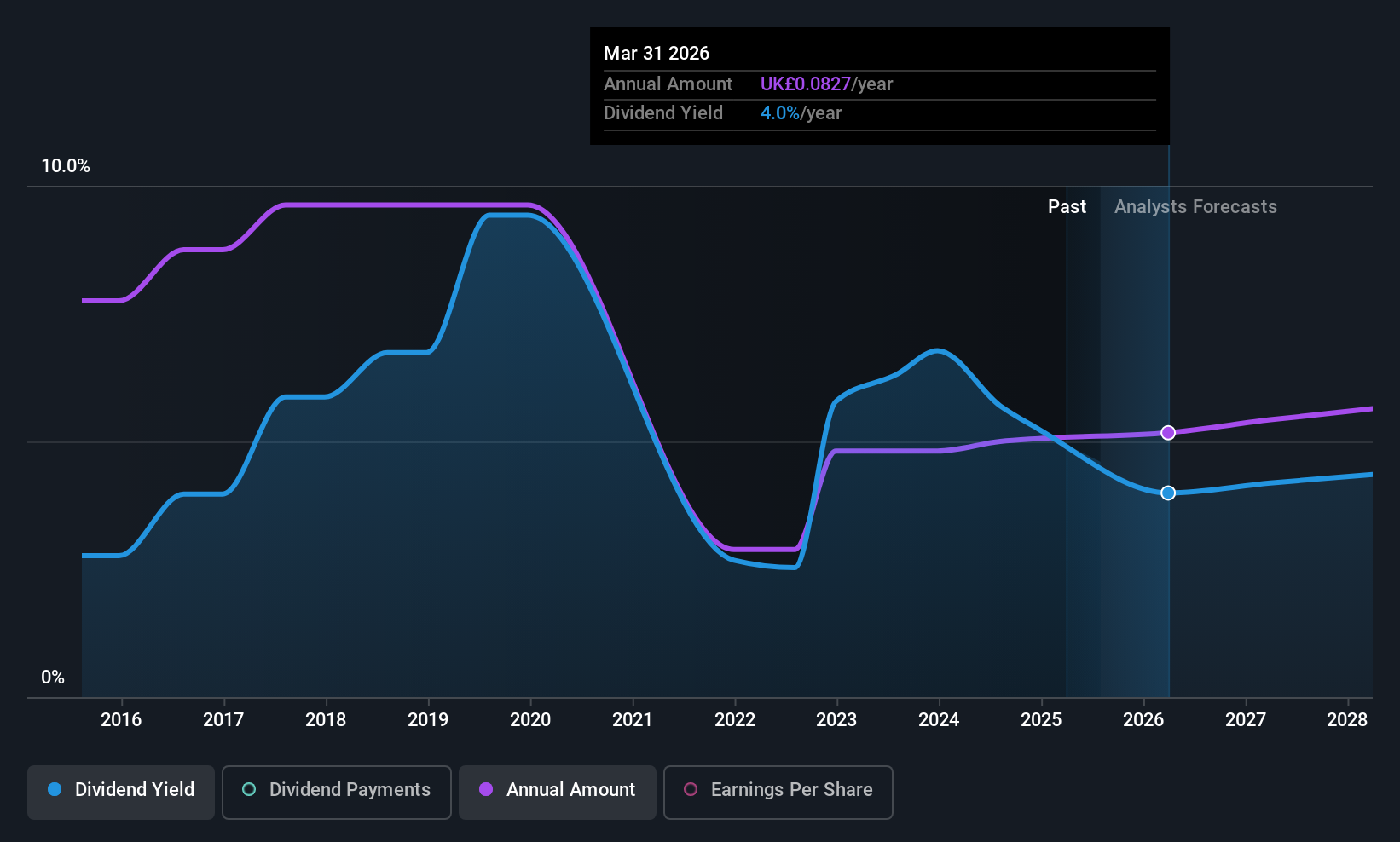BT Group plc (LON:BT.A) Stock Goes Ex-Dividend In Just Four Days
BT Group plc (LON:BT.A) stock is about to trade ex-dividend in four days. The ex-dividend date is usually set to be two business days before the record date, which is the cut-off date on which you must be present on the company's books as a shareholder in order to receive the dividend. The ex-dividend date is of consequence because whenever a stock is bought or sold, the trade can take two business days or more to settle. Therefore, if you purchase BT Group's shares on or after the 7th of August, you won't be eligible to receive the dividend, when it is paid on the 10th of September.
The company's next dividend payment will be UK£0.0576 per share. Last year, in total, the company distributed UK£0.082 to shareholders. Last year's total dividend payments show that BT Group has a trailing yield of 3.9% on the current share price of UK£2.072. Dividends are an important source of income to many shareholders, but the health of the business is crucial to maintaining those dividends. As a result, readers should always check whether BT Group has been able to grow its dividends, or if the dividend might be cut.
Dividends are usually paid out of company profits, so if a company pays out more than it earned then its dividend is usually at greater risk of being cut. Its dividend payout ratio is 76% of profit, which means the company is paying out a majority of its earnings. The relatively limited profit reinvestment could slow the rate of future earnings growth. We'd be concerned if earnings began to decline. Yet cash flow is typically more important than profit for assessing dividend sustainability, so we should always check if the company generated enough cash to afford its dividend. Thankfully its dividend payments took up just 38% of the free cash flow it generated, which is a comfortable payout ratio.
It's positive to see that BT Group's dividend is covered by both profits and cash flow, since this is generally a sign that the dividend is sustainable, and a lower payout ratio usually suggests a greater margin of safety before the dividend gets cut.
Check out our latest analysis for BT Group
Click here to see the company's payout ratio, plus analyst estimates of its future dividends.

Have Earnings And Dividends Been Growing?
When earnings decline, dividend companies become much harder to analyse and own safely. If earnings decline and the company is forced to cut its dividend, investors could watch the value of their investment go up in smoke. BT Group's earnings per share have fallen at approximately 9.3% a year over the previous five years. When earnings per share fall, the maximum amount of dividends that can be paid also falls.
The main way most investors will assess a company's dividend prospects is by checking the historical rate of dividend growth. BT Group's dividend payments per share have declined at 4.1% per year on average over the past 10 years, which is uninspiring. It's never nice to see earnings and dividends falling, but at least management has cut the dividend rather than potentially risk the company's health in an attempt to maintain it.
Final Takeaway
Is BT Group worth buying for its dividend? The payout ratios are within a reasonable range, implying the dividend may be sustainable. Declining earnings are a serious concern, however, and could pose a threat to the dividend in future. Overall, it's hard to get excited about BT Group from a dividend perspective.
If you're not too concerned about BT Group's ability to pay dividends, you should still be mindful of some of the other risks that this business faces. Our analysis shows 3 warning signs for BT Group and you should be aware of these before buying any shares.
A common investing mistake is buying the first interesting stock you see. Here you can find a full list of high-yield dividend stocks.
Valuation is complex, but we're here to simplify it.
Discover if BT Group might be undervalued or overvalued with our detailed analysis, featuring fair value estimates, potential risks, dividends, insider trades, and its financial condition.
Access Free AnalysisHave feedback on this article? Concerned about the content? Get in touch with us directly. Alternatively, email editorial-team (at) simplywallst.com.
This article by Simply Wall St is general in nature. We provide commentary based on historical data and analyst forecasts only using an unbiased methodology and our articles are not intended to be financial advice. It does not constitute a recommendation to buy or sell any stock, and does not take account of your objectives, or your financial situation. We aim to bring you long-term focused analysis driven by fundamental data. Note that our analysis may not factor in the latest price-sensitive company announcements or qualitative material. Simply Wall St has no position in any stocks mentioned.
About LSE:BT.A
BT Group
Provides communications products and services in the United Kingdom, Europe, the Middle East, Africa, the Americas, and the Asia Pacific.
Undervalued with acceptable track record.
Similar Companies
Market Insights
Community Narratives



